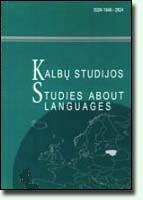Cultural Studies in LSP Syllabus at Tertiary Level
Cultural Studies in LSP Syllabus at Tertiary Level
Author(s): Violeta Karastateva, Asta Balčiūnaitienė , Nadezhda Tsoneva Subject(s): Language and Literature Studies
Published by: Kauno Technologijos Universitetas
Keywords: FLT; ESP; Cultural Studies; Intercultural Communication; Needs Analysis
Summary/Abstract: Despite globalisation and the movement towards greater European integration, national identities remain important. Teaching Cultural Studies (CS) and Intercultural Communication (IC) skills in FLT has been in the vanguard of language teaching-and-learning methodology for the last two decades. Classroom practice has proved the various benefits of intercultural education possessing great potential for bringing cultures and languages together. It should be noted that predominantly the secondary school context has been explored whereas relevant experience at the tertiary level is limited and sporadic. At the same time the role of Cultural Studies in ESP has been under-estimated or simply missing in the specialised literature. This paper introduces an overview of the effective Cultural Studies approaches and is aimed at revealing the need for implementing culture in the ESP classroom. To this end, the authors have conducted an experiment within an Erasmus project for lecturers’ mobility between Vytautas Magnus University, Kaunas, Lithuania and the Technical University, Varna, Bulgaria. The data from a Cultural Studies needs analysis questionnaire, filled in by students from different majors, has been processed, analysed and presented. The outcomes of this analysis gives serious food for thought concerning the need for introducing systematic Cultural Studies approaches to the traditional ESP syllabi. The national, institutional and curriculum peculiarities of both universities are considered in view of the degree of students’ intercultural awareness and readiness to face and handle cultural phenomena and intercultural communication incidents. The study has led to the conclusion that, at non-philological higher institutions and technical universities, greater advantage should be taken of the FLT lessons. They prove to be one of the limited opportunities for preparing these students for successful intercultural communication regarding their future professional realization in a constantly enlarging new-European context and demanding multi-cultural environment.
Journal: Kalbų Studijos
- Issue Year: 2007
- Issue No: 10
- Page Range: 60-67
- Page Count: 8
- Language: English

